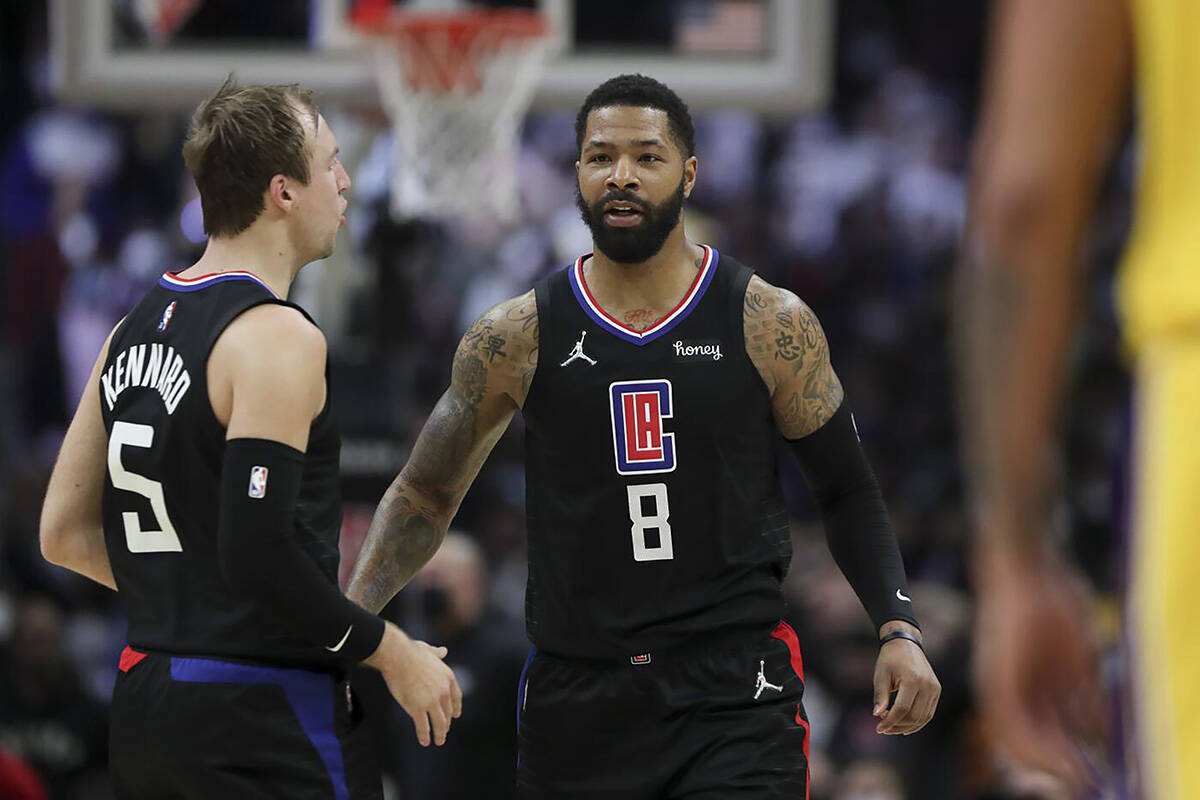Charges against ex-NBA player dropped after Las Vegas casino debt paid
Las Vegas prosecutors on Wednesday dismissed fraud and theft charges against former NBA player Marcus Morris after he wired them nearly $300,000 to pay off his alleged casino debt.
Clark County Deputy District Attorney Charles Thoman stated that Morris, who had two separate warrants issued for his arrest in March and June, was taken into custody in Fort Lauderdale, Florida, on July 27. According to a YouTube video Morris posted describing the event, the Boca Raton resident was at the airport with his family when officers approached and detained him.
On July 29, Thoman said, the district attorney’s office received a wire transfer from Morris for $291,750. According to court records, Morris owed $265,000 to two Strip casinos, the MGM Grand and the Wynn, while the district attorney’s office charged, roughly, an additional $26,000 in collection fees.
He was released from custody shortly thereafter.
Morris played in the NBA for roughly 13 years, with his longest tenure being on the Los Angeles Clippers. He has also played for the Boston Celtics, New York Knicks and Philadelphia 76ers.
Morris’ lawyer, Cheryl Wilson, declined to provide a statement or discuss the case with a reporter after the Wednesday court hearing.
‘He left town’
Casino markers, commonly issued by casinos in Las Vegas and throughout Nevada, are short-term, interest-free loans that let gamblers play on credit after they apply, providing personal information like their current address, employment, and bank account number.
If a marker remains unpaid for about 30 days, it is treated as a “bad check.”
The casino will first attempt to collect payment from the bank account on file. If the payment bounces — as Thoman said was the case for Morris’ debt — the casino sends a certified letter giving the gambler 10 days to repay the debt.
If the marker remains unpaid, the casino can refer the case to the district attorney’s office, which then takes over jurisdiction. The office sends another certified letter with an additional 10-day repayment deadline, including any collection or processing fees. After this final deadline, the district attorney may order the arrest of the person accused of writing bad checks.
Thoman, who works in the office’s bad check unit, explained that once a casino marker case is submitted for prosecution, the district attorney can impose a fee of up to 10 percent on top of the defendant’s existing debt. Thoman noted that this money helps cover the unit’s operating expenses.
“These cases start at the casino level,” Thoman said. “The casino tried to get him to pay, and he left town.”
He said that multiple certified letters were sent to Morris’s last known address without a response.
‘Clearing the air’
By July 30 — one day after the district attorney’s office received Morris’ wire transfer — he had been released from custody, according to a now-deleted statement he posted on Instagram. Then, on July 31, he and his twin brother, Markieff Morris, who is also a former NBA player, posted a YouTube interview titled “Marcus and Markieff CLEAR THE AIR!”
In the video, the brothers were seated outdoors on what appeared to be a backyard pool deck with a microphone in front of them.
“I never physically wrote a check with my name to anybody,” Morris said. “What I’m upset about is — knowing how long we’ve been playing in Vegas, taking out markers and repaying them — it never dawned on me that you could be arrested for that type of thing.”
He added that the markers he was given could only be used to gamble and not to “go cash in” for other expenses.
Morris said that the situation, which he suggested was blown out of proportion, had “put him in jail in front of his family.”
According to Morris, he was at the airport with his mother and children and was planning to fly to the Bahamas when officers handcuffed him.
The brothers, in the response video, highlighted Morris’ arrest as a cautionary tale, urging other high-profile gamblers to “read the fine print” before accepting markers.
A ‘reasonable’ resolution
Despite Morris’ online claims that the situation should have been handled differently, local defense attorney Joshua Tomsheck called the district attorney’s office “reasonable” in resolving most casino marker cases.
“Paying the money back doesn’t necessarily mean [the case] is going to get dismissed,” Tomsheck said. “If DAs wanted to, they could certainly prosecute him still. The criminal offenses have already happened.”
“However, the general policy of the DA’s office is that they are trying to collect money on behalf of the casino properties. And because the DA’s office has a statutory allowance to essentially be a paid bill collector, they get 10 percent of what they recover,” he added.
Alan Feldman, Director of Strategic Initiatives at UNLV’s International Gaming Institute, called the criminality of casino marker-related offenses “a bit unusual.”
“That if you owe someone money and don’t pay it back, that’s considered a crime until proven otherwise,” Feldman said. “That’s the way it is here in Nevada, but I think that is related to the fact that there is no collateral when you sign for a marker. You can walk out with it, and there is no recourse.”
Feldman noted most cash cages have signage explaining the law. “From what it sounds like, I don’t think [Morris] was trying to defraud anybody,” Feldman said. “He just didn’t take it as seriously as he needed to.”
Contact Akiya Dillon at adillon@reviewjournal.com.



















